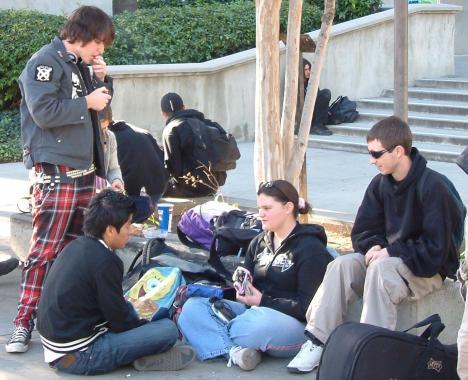By Griffith Fuller

NEW SMOKING SECTION
By Griffith Fuller
There is a silent battle occurring on Riverside Community College’s campus right now.
RCC’s Health Services and President Salvatore Rotella’s Strategic Planning Committee have been in disagreement ever since the proposal of new designated smoking areas.
During an October meeting the committee approved and adopted seven new designated smoking areas. One of the purposes was to give smokers a central area. This was at the request of the smokers, according to Eddie Sanchez, a student representative for Rotella’s Strategic Planning Committee.
“The smokers were aware of the Passport to College children coming through,” Sanchez said. “If we had more areas on campus, it wouldn’t be as visible.”
The planning of the additional areas was put to a halt when Patty Smith and Carlos Carrio, of the health office, asked to be placed on the agenda for the next Strategic Planning Committee meeting which was held in November. They wanted to re-negotiate the decision of the seven additional smoking areas, as well as the remaining two.
During the meeting, it was decided to re-negotiate additional smoking areas and keep the original three. The smoking area in front of the Martin Luther King Library is still considered somewhat of a construction area despite the fact that construction in that immediate area was finished in early October.
From the additional seven areas that were proposed the committee will choose a third area.
Members of the Strategic Planning Committee said that limiting the smoking areas was not a wise decision. Health Services was concerned about enforcement and wanted the district to hire a smoking officer who would solely monitor smokers. The smoking officer would fine smokers up to $250 if they violate the rules. The committee wants to find a way to have it regulated in a fair manner.
“Some members on the Strategic Planning Committee are not concerned about student smokers who do not use the smoking areas, but rather certified staff and professors who smoke outside of the areas that set bad examples for students,” Sanchez said.
The Riverside Campus has been in conflict over smoking, but what about the other two areas?
“Moreno Valley is completely smoke free; Norco can’t make up their mind,” Carrio said.
That statement is not shared with others on campus.
“That is a false statement, Moreno Valley and Norco have designated areas,” Sanchez said. “Moreno Valley tried to be smoke free, but it wasn’t working. They did this the last month or so.”
Carrio, a health educator, said that RCC is one of the first colleges’ in the nation to go smoke free.
“More than 85 percent (of students) would like to go smoke free,” Carrio said. “We want to pursue this and make it completely smoke free. When students come onto this campus, it will give high school students the mind-set that they can start smoking. If there are eight designated areas, then it might as well be a smoking campus.”
The sub-committee pulled out of the proposal after being pressured by Health Services to cut the additional smoking areas, according to Sanchez. The subcommittee is working hard to protect the rights of student and staff smokers, but Health Services staff see it as a great burden.
“We have come a long way to establish the policy,” Carrio said. “We can’t go backwards. This is a health issue. We can’t allow small special groups to allow us to go backwards.”
Health Services operates by the principle of creating an institution of higher learning to educate and stay healthy at the same time. According to Carrio and Health Services, 30 percent of students between the ages of 18 to 24 will die prematurely.
“Smoking kills 3,000 people every three days,” Carrio said. “Why should we allow that? 53,000 a year die from second hand smoke. They should be ashamed of themselves, that we are even debating an issue like this on campus.”
Carrio felt that proposing seven new areas was ridiculous, and by doing that RCC would be going backwards instead of progressing.
“It’s a no-brainer,” Carrio said. “I spear-headed this movement. I’m really passionate about it.”
The movement is not the only thing Carrio is passionate about.
“Smokers say that we are violating their rights; smokers have no alienable rights,” Carrio said. “Smokers are not a protected class. Smokers don’t have any rights,”
Student government officials see it another way.
“The Health Services need to understand that if people want to smoke they have the choice to smoke,” Sanchez said. “Students who pay fees and go to school here have rights to safe designated smoking areas. That’s the opinion of Dany Wilson (Riverside president) and myself.”
At a meeting the committee held in November, Dany Wilson spoke on behalf of the smokers. Sanchez stated that it was the smoker’s suggestion to find a third area so the schoolchildren (Passport to College) won’t see them smoke.
“We want to urge students to use the area and be wise, pick up after themselves,” Sanchez said.
There have been improvements to the remaining smoking areas; signs, benches, and trays have been added. Even the temporary MLK Library area seems to have been extended to the patio of the A. G. Paul Quadrangle entrance.
Health Services and the subcommittee will battle the smoke free issue until the end of the spring semester for now.
“The overall big picture is that we want to be an institution in which RCC takes the lead of creating a healthy environment for the people,” Carrio said.






